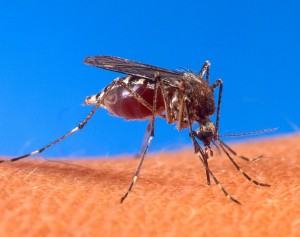WEDNESDAY, 15 DECEMBER 2010
Female mosquitoes need protein to produce their eggs, causing them to seek blood meals instead of just the plant fluids required by their male counterparts. Bart Bryant and his colleagues recognised that microRNAs, in particular miR-275, must be involved in egg production because their levels were elevated during this process. The team developed a way of neutralising these molecules by inserting synthetic ‘antagomir’ particles, which bind to microRNAs. Treated female mosquitoes were unable to digest and excrete blood properly, which resulted in impeded egg development. The lab plans further investigations to pinpoint the exact role of miR-275 in the genetic control of egg development and blood digestion.This finding has potentially wide-reaching consequences. There is a good chance that this research could be used to restrict the reproduction of Aedes aegypti mosquitoes in tropical areas. The resulting reduction in vector populations could provide some respite from the devastating effects of yellow and dengue fevers.
Written by Natalie Lawrence

